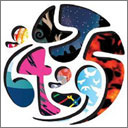
About 10 years ago, there was much hoo-hah on the dance scene about something called the Jungle Committee. This was a self-appointed group of DJs and producers that issued diktats designed to protect the artistic sanctity and commercial progress of drum'n'bass. In retrospect, it would be fascinating to see the Jungle Committee's minutes, which presumably read something like: 1) Make string of unbearably pompous quintuple albums (motion passed). 2) Lose public interest and recording contracts as result of unbearably pompous quintuple albums (motion passed). 3) Get bit part in EastEnders, appear on Celebrity Big Brother and become national laughing-stock (Goldie to investigate further).
In 2005, the notion that drum'n'bass might be so culturally important as to require a governing body seems distant and quaint, like the film of blacked-up Edwardians clog-dancing on The Lost World of Mitchell and Kenyon. And yet, it's tempting to speculate that something similar might be going on today, within the chill-out scene. How else do we account for the gulf between chill-out music in theory (a boundless world of possibility, liberated from the guitars/ bass/ drums conventions of rock and the obligation to make people dance), and chill-out music in practice (identikit floaty bilge)? Clearly, some shadowy chill-out politburo is drawing up rigorous guidelines and putting on the squeeze.
Against this background, you can understand why chill-out duo Lemon Jelly are so cherished. They keep coming up with interesting new concepts: records packaged in leather and denim, child-friendly Saturday-morning matinee shows, a sound that revels in a kind of English whimsy influenced by the Bonzo Dog Doo-Dah Band. Their most influential idea was perhaps their most low-key. In 2001, the duo anonymously released a single called Soft, which sampled Chicago's deathless 1976 number one If You Leave Me Now. Soft presaged both the current glut of dance hits based on beyond-the-pale soft-rock tracks and Guilty Pleasures, the hugely successful compilations of forgotten, uncool 1970s and 1980s hits.
Now Lemon Jelly have constructed an entire album to Soft's blueprint. Each of '64-'95's nine tracks samples a deeply unfashionable record from a year within the title's timeframe. 1988 is represented not by acid house, but by Masters of Reality's metal; 1976 offers fruity Oxbridge vocal group the King's Singers instead of the Sex Pistols; 1993 is depicted not as grunge's zenith, but the year that gave us Atlantic Ocean's pop-trance smash Waterfall.
It's a concept that raises exactly the same mixed feelings as the whole Guilty Pleasures phenomenon. At its best, it's an iconoclastic corrective to the numbing "classic rock" canon, a raspberry to the wearying, middlebrow "good taste" of those who worship bland alt.country. Irrepressibly perky and trite, Atlantic Ocean's Waterfall is precisely the kind of record music snobs loathe, but '93 (Don't Stop Now) turns it inside out, slowing the pace and relentlessly repeating certain passages until it sounds nauseating and sinister. The blizzard of guitar noise on '79 (The Shouty Track) makes the Scars, a post-punk band of little consequence, sound like the most thrilling thing out. If '75 (Stay With You) does nothing that Eric Prydz's Call on Me didn't do last year, it's so charming that it scarcely matters.
However, when its tracks don't transform their samples into something new, or else sound no different from Lemon Jelly's 2002 debut Lost Horizons, '64-'95 - like Guilty Pleasures - seems to be less about limitless musical exploration than about smirking kitsch. The closing '64 (Go) deviates from the sampling concept to include vocals by Star Trek's William Shatner. The King's Singers-sampling '76 (The Slow Train) is repetitive and irritating. Worse, it keeps nudging you in the ribs and winking conspiratorially, expecting you to guffaw at the incongruity of it all.
Lemon Jelly's nearest competition is Zero 7, precisely the kind of band who could cause you to believe in the chill-out politburo: so boring they won't do anything unless it has already been done three times by Air. So it seems almost churlish to criticise Lemon Jelly when their ideas fall flat: at least they're having ideas, which is more than can be said for their contemporaries. Nevertheless, while a lot of '64-'95 works, much of it appears to arrive sporting ironic quote marks. When it does, you get the uneasy sensation that you might as well be on the dancefloor at School Disco, the horrible nightclub where hen parties and rugger-buggers dress in school uniforms and chortle the night away to Shakin' Stevens. And, as anyone who's had the misfortune will tell you, that's a pretty dispiriting place to be.

